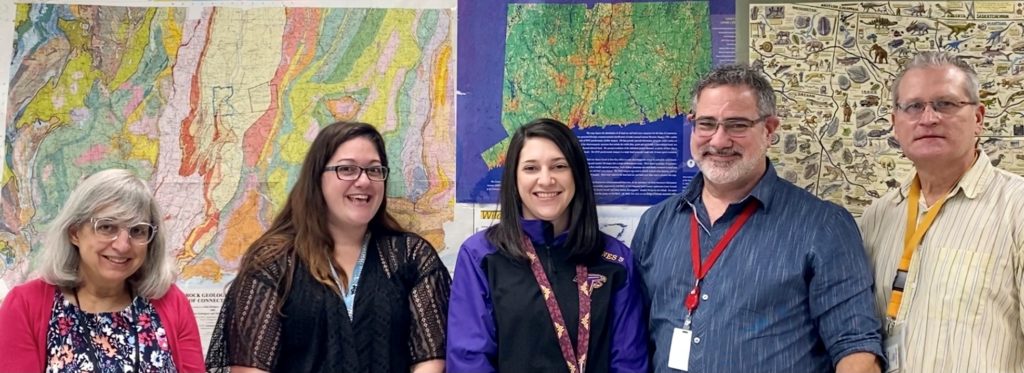
| Grade 9 | Grade 10 | Grade 11 | Grade 12 |
|---|---|---|---|
| 1 credit | 1 credit | 1 credit | 1 credit |
| General Science
Honors General Science |
Biology
Honors Biology |
Chemistry
Honors Chemistry Advanced Topics in General Science |
Physics Honors Physics Astronomy Environmental Science Forensics Human Anatomy & Physiology |
Course Descriptions
Advanced Topics in General Science allows students to continue to explore aspects of Chemistry, Physics, and Earth and Space Sciences and to apply data collection, analysis, and interpretation skills related to those scientific concepts. Based on the Next Generation Science Standards, the course is made up of three related disciplines: Earth and Space Science; Physical Sciences; and Engineering, Technology, and Applications of Science. This framework articulates the standards as well as the science and engineering performances, disciplinary core ideas, and crosscutting concepts. The curriculum describes the specific performances that will be assessed on the Next Generation Science Assessment. Students are expected to complete several inquiry-based projects over the course of the year.
Following the Connecticut Science Framework 3 and 4, Biology I/Foundations of Life Science 10 with Lab continues the students’ scientific inquiry training as preparation for the NGSS Assessment. The course, which builds upon the knowledge of biological concepts, includes: cell chemistry, biotechnology, genetics, evolution and biodiversity. As in grade 9, students will continue forming hypotheses, designing experiments, analyzing data and drawing conclusions while expanding their understanding of the content standards.
This lab course builds on knowledge developed in the previous integrated science courses. Students will be introduced to chemistry topics such as: atomic structure, chemical bonding, energy changes, stoichiometry, periodicity, properties of gases, solutions, acid-base theory, electrochemistry and organic and biochemistry. Students will investigate the properties, composition and structure of matter and the laws that govern the combination of elements and reaction of substances. The application of scientific concepts to trade experiences reinforces the curriculum. Students will apply their knowledge of chemistry to various problem-solving activities with the use of science-specific technologies and standard laboratory tools.
This course is an introduction to the study of the solar system, the stars, galaxies, nebulae and newly discovered celestial bodies. This course is designed to raise the level of student awareness to celestial objects including the history, properties, interrelationships and origins of the universe. Research, on line programs and independent study is an integral component of this program. Laboratory activities are included.
Environmental Science surveys key topic areas including the application of scientific process to environmental analysis; ecology; energy flow; ecological structures; earth systems; and atmospheric, land and water science. Emphasis is placed on human interaction with the geosphere, hydrosphere, atmosphere and biosphere. Topics also include the management of natural resources and analysis of private and governmental decisions involving the environment.
This course is designed to challenge students with topics such as fingerprinting; DNA analysis; blood typing and spattering; trajectories (for ballistics as well as blood spattering); comparative anatomy; chemical analysis of drugs, poisons and trace evidence; and the dynamics of physics. Students will learn about the careers involved with Forensic Science and will play mock roles as experts in the field to solve crimes. They will learn teamwork in solving the mock crimes and have a chance to change their roles as the year progresses. The students will be provided training in the analysis of data and chemical/biological evidence.
General Science 9 with Lab develops the student’s scientific inquiry by integrating the sciences, with a focus on preparing the student. This course builds on the concepts and principles of chemistry, environmental topics and physics. The application of scientific concepts to trade experiences reinforces the curriculum. This course covers areas of chemical reactions, energy transfers in life processes and biochemistry. Students will form hypotheses, design experiments, use technology, analyze data and draw conclusions. Course content reflects the Connecticut Next Generation Science (NGSS) Assessment.
See section XV for Honors/Advanced Level Selection Criteria
Prerequisite: Successful completion of Algebra I and a grade of 95 or a grade of 85 in Honors General Science 9
The honors section is a more rigorous application of the Biology I/Foundations of Life Science 10 with Lab. Topics are covered more in depth and include additional hands-on laboratory work. Individual student research topics in Life Science are emphasized in this course.
See section XV for Honors/Advanced Level Selection Criteria
Honors Chemistry is a laboratory and mathematically-oriented science course. Basic classical concepts are emphasized in this college preparatory course. Topics studied will include measurement, atomic and molecular structure and theory, periodic law, chemical bonding, formulas, equations and stoichiometry, gases, liquids, solids and solutions, chemical reactions (acid-base and red-ox), nuclear and organic chemistry.
See section XV for Honors/Advanced Level Selection Criteria
The honors section is a more rigorous application of the General Science 9 with Lab. Topics are covered more in depth and include additional hands-on laboratory work. Individual student research topics in Physical Science are emphasized in this course.
See section XV for Honors/Advanced Level Selection Criteria
A more comprehensive lab course, students will gain an in-depth knowledge and appreciation of the physical world, using both the qualitative and quantitative study of the principles of physics. The application of scientific concepts to trade experiences reinforces the curriculum. Honors Physics stresses the use of mathematics to illuminate the physical situation and problem solving. The prerequisite for taking this course is successful completion of Algebra II or, upon permission of instructor, concurrently taking Algebra II.
This course is an introduction to the structure and function of the human body. It provides students with a solid foundation in human anatomy and physiology. This course includes a study of diseases, conditions and an emphasis on how various organ systems maintain homeostasis. The study of human biology incorporates a variety of learning activities such as problem-solving, hands-on-activities, experiments and projects to learn the content. The use of core and advanced biology equipment includes microscopes, human models and prepared slides of the various body sectors.
Using a laboratory approach, students will investigate Newton’s laws, classical mechanics, universal gravitation, astronomy, electricity and electrical forces and the electromagnetic wave spectrum (EMS). The application of scientific concepts to trade experiences reinforces the curriculum. Through participation in laboratory experiences, students will develop an understanding of connections between physics and the workings of simple and complex technological devices.

